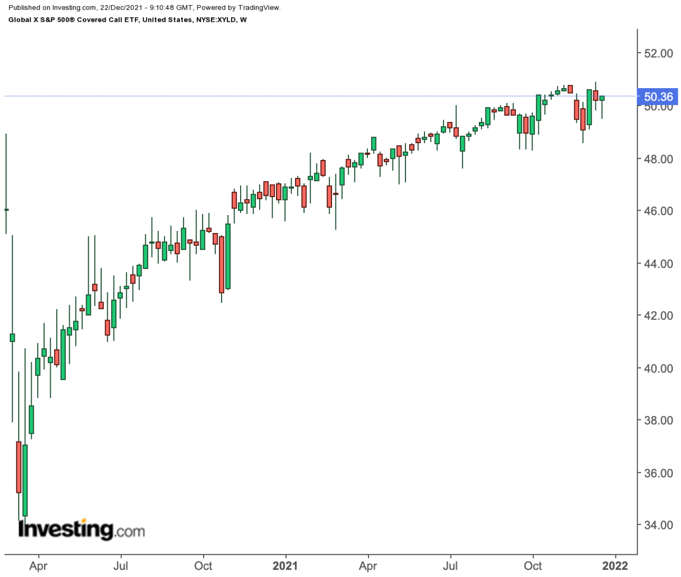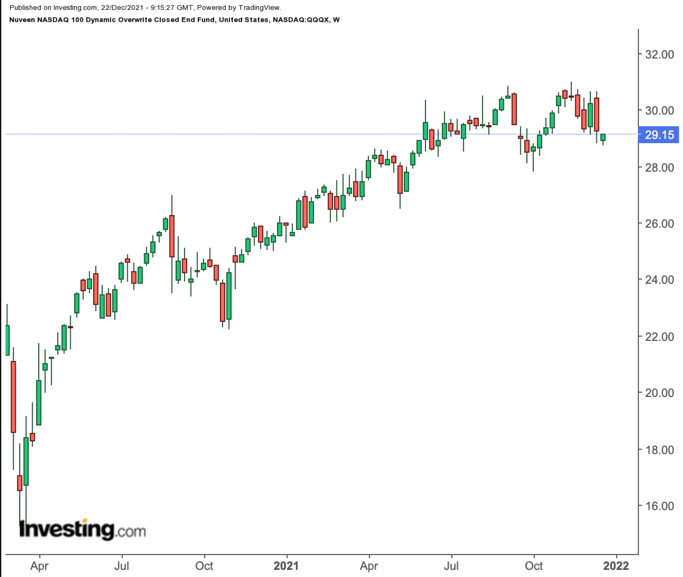Options-based exchange traded funds (ETFs) have been gaining popularity among investors. Such funds are typically designed to provide income or downside protection (i.e., hedging). In other words, investors will note that most of these ETFs offer a trade-off between upside growth participation and downside protection.
Regular followers of this column would know that we frequently cover option strategies. Those who need refreshers could refer to several recent articles. We have also discussed a number of funds that use options.
Today’s article introduces two other ETFs that use covered call strategies. To recap, in a covered call strategy, an investor sells (writes) a call option for an asset that is already in the portfolio. As the investor has a long stock position, shares can be delivered in case the call option buyer decides to exercise the option.
When an investor buys (goes long) an asset and simultaneously sells call options (goes short) on that position, the covered call strategy can also be called a "buy-write" transaction.
ETFs with these strategies might appeal to investors looking to generate yield amidst increased volatility in the markets. Covered call ETFs also provide some downside protection when markets come under pressure. However, we should note that such option-linked funds are typically more expensive than passively managed long ETFs.
-
Global X S&P 500 Covered Call ETF
- Current Price: $50.36
- 52-Week Range: $45.25 - $50.90
- Dividend Yield: 9.02%
- Expense Ratio: 0.60% per year
The Global X S&P 500® Covered Call ETF (NYSE:XYLD) buys the stocks in the S&P 500 Index, and at the same time “writes” or “sells” covered calls on the index. Part of the option premium generated is then paid out as monthly distributions—a strategy that appeals to income seekers.

XYLD tracks the CBOE S&P 500 BuyWrite. The fund started trading in June 2013, and has $833.4 million under management.
Since the start of the year, the fund is up over 7.9% and currently offers a yield of over 9%. By comparison, the S&P 500 Index is up 22.5% year-to-date (YTD).
A fund like XYLD might be an appropriate choice for those who prefer a monthly high income rather than the full capital growth potential of the underlying securities.
2. Nuveen NASDAQ 100 Dynamic Overwrite Closed End Fund
- Current Price: $29.15
- 52-Week Range: $25.00 - $31.00
- Dividend Yield: 6.21%
- Expense Ratio: 0.89% per year
With our second fund, we move from the S&P 500 Index to the NASDAQ 100. The Nuveen NASDAQ 100 Dynamic Overwrite Closed End Fund (NASDAQ:QQQX) sells covered calls on 35%-75% of the notional value of the equity portfolio that tracks the NASDAQ 100 index.
Fund managers typically sell more calls when market volatility is high and thus premiums are expensive. The aim is to decrease volatility of returns as well as the downside risk. However, the strategy also reduces the fund’s capital appreciation potential.

QQQX started trading in late January 2007 and has net assets of $1.2 billion. So far this year, the ETF has returned around 11.1%, and comes with a yield of well above 6%. By comparison, the NASDAQ 100 Index is up about 21.5% YTD.
We believe a fund like QQQX offers a balance between income generation, hedging during short-term price pullbacks, as well as growth potential. Thus, it could be a good choice for income investors who are bullish on growth shares in the NASDAQ 100, but also appreciate high yields.
